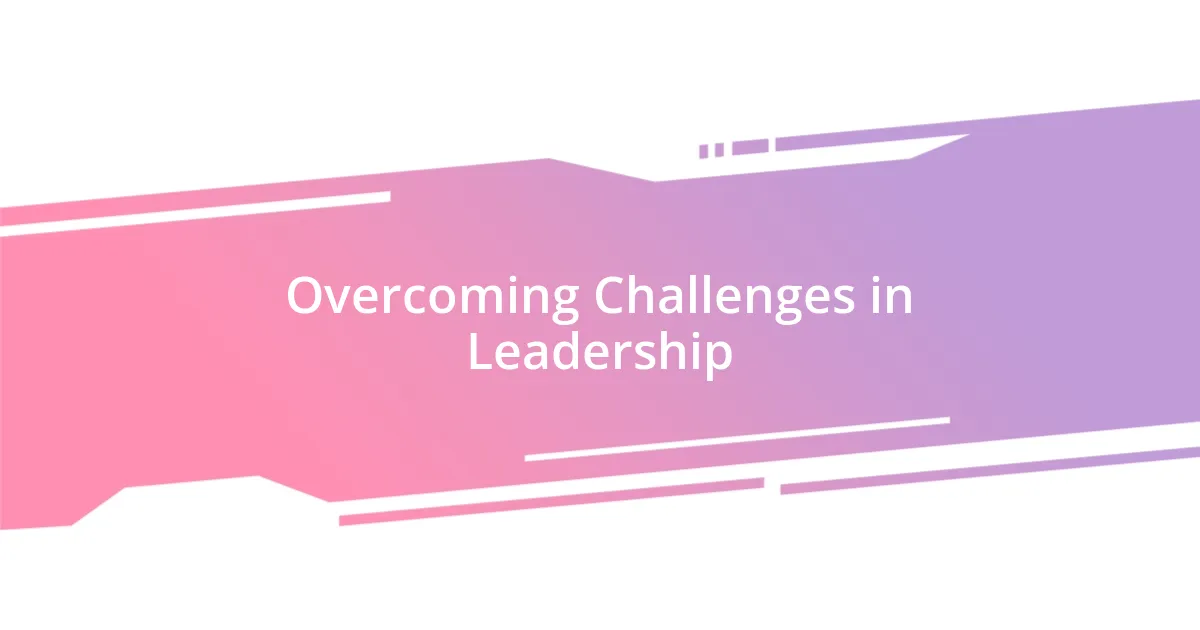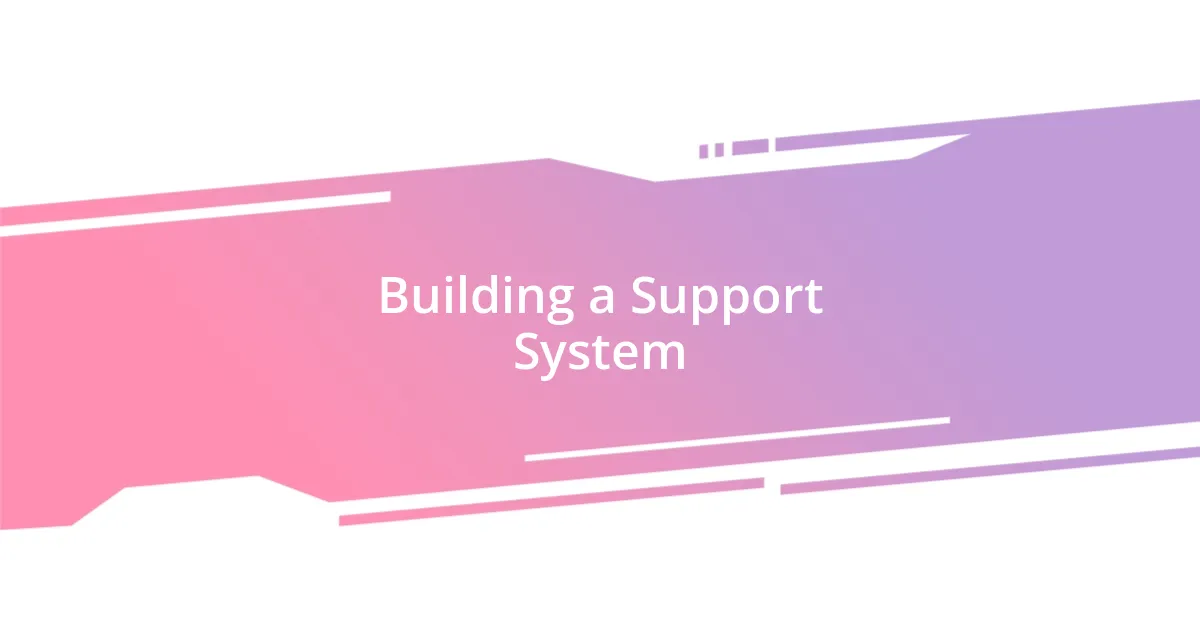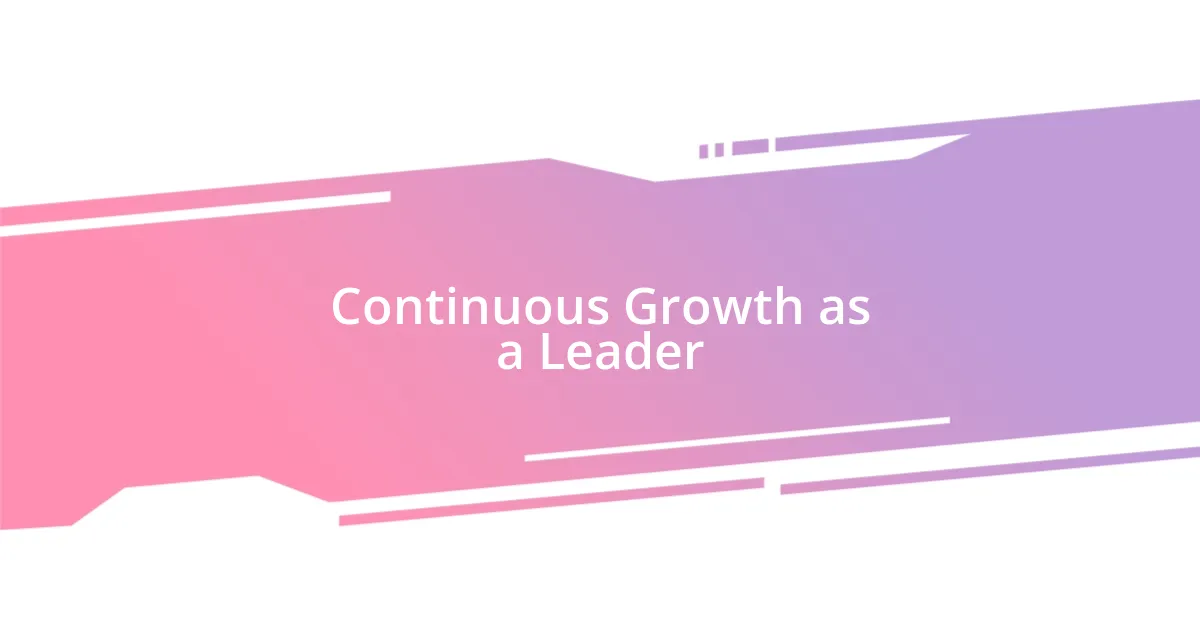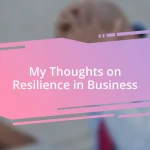Key takeaways:
- Vulnerability in leadership fosters authenticity and connection with the team.
- Effective leadership involves active listening, empathy, and creating a supportive team culture.
- Overcoming challenges through open dialogue and collaboration strengthens team bonds and trust.
- Continuous growth as a leader requires seeking feedback, nurturing emotional intelligence, and celebrating small wins.

My Personal Leadership Journey
I remember the first time I was thrust into a leadership role. I was leading a team project in college, and I felt an overwhelming blend of excitement and fear. Did I have what it took? Those early moments taught me that vulnerability is actually a strength in leadership; it opens doors to authenticity and connection with my team.
As I navigated through various roles in my career, I encountered both triumphs and failures that shaped my approach. There was a time when a project I was passionate about flopped, leaving me questioning my abilities. Reflecting on that experience, I realized that every setback carries a lesson; it taught me resilience and the importance of nurturing a supportive team culture where everyone feels safe to express their ideas and concerns.
The more I led, the clearer my values became. I discovered that empowering others is just as crucial as making tough decisions. For instance, when I encouraged a quieter colleague to share their perspective during a meeting, I witnessed a shift in their confidence. Isn’t it incredible how leadership can be about elevating others, not just ourselves? Through these moments, I’ve come to embrace a leadership style rooted in collaboration and compassion.

Key Influences on My Leadership
My leadership journey has been shaped by several key influences that molded my philosophy and actions. One significant influence was my mentor during my first job. I still remember the way she navigated tough conversations with grace, always taking the time to listen. This taught me that effective leadership hinges on active listening and fostering open dialogue within the team. I strive to emulate her style, making an effort to ensure everyone feels heard and valued.
Here are some key influences that have shaped my leadership approach:
- Mentorship: Learning through observation and guidance from experienced leaders.
- Feedback loops: Creating a culture where constructive feedback flows both ways.
- Empathy: Connecting with team members’ emotions to build strong relationships.
- Diverse perspectives: Valuing the different ideas that each team member brings to the table.
- Adaptability: Adjusting my leadership style based on the unique dynamics of each team.
I must also mention the transformative experience of volunteering for a leadership role in a community project. Here, I saw firsthand how collaboration can lead to innovative solutions. The collective brainstorming sessions were electric; ideas were bouncing off the walls! That energy ignited my passion for fostering inclusive environments, where everyone’s contributions can shine. This experience reinforced my belief that leadership isn’t just about authority—it’s about unity and shared vision.

Overcoming Challenges in Leadership
Overcoming challenges in leadership is an inevitable part of the journey. I vividly recall a moment when a key project was on the verge of collapse due to unforeseen circumstances. Instead of panicking, I gathered the team for a candid discussion. By openly addressing our collective fears and brainstorming solutions, we turned a potential disaster into a triumph. This experience taught me that confronting challenges head-on and fostering a sense of teamwork can transform adversity into opportunity.
One of the toughest challenges I faced was dealing with conflict within the team. I remember two strong personalities clashing during a critical phase of a project, which threatened our productivity. Instead of choosing sides, I facilitated a meeting where each person articulated their thoughts. That dialogue not only resolved the conflict but also strengthened our bond as a team. I learned that navigating through disagreements can actually build trust and improve collaboration, enriching our workplace environment.
In my experience, resilience is a cornerstone of effective leadership. There was a time when external pressures made me question my direction. I took a step back to reflect on the core values that guide me. This period of introspection helped me emerge not just as a leader but as a more empathetic person. I realized that leadership isn’t about perfection; it’s about learning and growing through challenges. Isn’t that what makes the journey worthwhile?
| Challenge | Approach |
|---|---|
| Project Collapse | Gathered the team for open discussion, fostering a collaborative solution. |
| Team Conflict | Facilitated dialogue, encouraging mutual understanding and trust-building. |
| External Pressures | Reflected on core values, emphasizing growth and empathy over perfection. |

Developing a Leadership Mindset
Developing a leadership mindset starts with self-awareness. I remember a time when I took a personality assessment for a leadership program. The results opened my eyes to my strengths and vulnerabilities, and that revelation spurred me to embrace my authentic self. Have you ever taken a moment to reflect on your own style? It can be a game-changer, helping you lead in a way that feels right to you.
Another essential aspect is the willingness to learn continuously. I once attended a workshop where a seasoned leader shared their mistakes candidly. It struck me how vulnerability can be a powerful teaching tool. We often think leaders have to be perfect, but my experience tells me that openness about imperfections fosters a culture where everyone feels safe to express themselves. So, why not share your learning journey with your team?
Lastly, I’ve discovered that fostering a growth mindset within your team can elevate everyone involved. I felt this deeply during a team project where we faced significant challenges. Instead of allowing setbacks to demotivate us, I encouraged an environment where we could celebrate small wins and learn from failures. It was exhilarating to witness my teammates’ resilience and creativity bloom. How do you nurture a similar spirit among those you lead? The collective growth of individuals can amplify a team’s success, creating a ripple effect beyond what you might imagine.

Building a Support System
Building a supportive network has played a crucial role in my leadership journey. I remember reaching out to a mentor during a particularly challenging period. Their guidance not only offered me a fresh perspective but also reminded me that I wasn’t alone in my struggles. Have you ever experienced that sense of relief when sharing your burdens? I find that it’s empowering to know others are willing to lend their support and wisdom.
In my experience, a diverse support system enriches the quality of advice and perspectives I receive. Once, I gathered a group of colleagues from different fields to discuss a new initiative. Each person brought unique insights, which sparked ideas I hadn’t considered before. This collaborative approach not only deepened my understanding but also reinforced the idea that everyone has value to contribute. Don’t you think that tapping into varied experiences can lead to innovative solutions?
Moreover, vulnerability in building a support system can foster deeper connections. I recall confiding in my team about my own uncertainties regarding a project. Instead of projecting confidence all the time, this honesty encouraged openness among them. They began to share their own concerns, and what followed was an unprecedented level of collaboration and support. Isn’t it fascinating how showing our own humanity can strengthen bonds and enhance our leadership capabilities?

Practical Tips for Aspiring Leaders
Finding your voice as a leader can be transformative. I remember my first team meeting where I hesitated to share my thoughts, fearing judgment. However, I soon realized that my perspective was valid, and voicing it helped others feel empowered to contribute too. Have you ever held back in a discussion, only to wonder how different the outcome might have been if you had spoken up? Embracing your voice can inspire others to do the same.
Another invaluable tip is to practice active listening. During a recent team brainstorming session, I intentionally focused on listening rather than preparing my responses. This shift allowed me to truly understand my team’s ideas and concerns, which in turn built trust. Isn’t it incredible how simply paying close attention can impact the dynamics of a team? I found that people are more likely to share when they know they’re being heard.
Lastly, setting clear goals and celebrating achievements along the way is crucial. I once implemented monthly check-ins to track our progress on a long-term project, and we took the time to acknowledge each small success. It was rewarding to see how recognizing even minor milestones boosted morale and motivation. How often do you celebrate the small wins with your team? I believe this practice fosters a sense of accomplishment and propels everyone toward greater success.

Continuous Growth as a Leader
Continuous growth as a leader is something I genuinely believe in. I recall a pivotal moment in my career where I took part in a leadership workshop. The experience opened my eyes to new frameworks for decision-making that I had never considered. Have you ever attended a training that shifted your perspective dramatically? Embracing new ideas like that helps me to adapt and evolve as a leader, making my approach more effective.
One powerful lesson I learned about growth is the importance of seeking feedback. During a performance review, I received constructive criticism about my communication style. At first, it stung a bit, but I realized that this was an opportunity for growth. Since then, I actively ask my team for input on how I can improve. Isn’t it amazing how a simple question can unlock pathways for personal and professional development?
Moreover, I find that leadership growth isn’t just about acquiring skills; it’s also about nurturing emotional intelligence. I remember a moment when I had to deliver tough news to my team. Instead of just sticking to the facts, I took time to express my empathy and understanding of their feelings. That moment taught me that acknowledging emotions can strengthen trust and commitment within a team. How do you think emotionally connecting with your team affects overall morale? In my experience, it makes a world of difference.














